Marking what will no doubt remain the highlight of my career as a someone who writes about movies, something I wrote about movies was quoted in The New York Times last year.
In a particularly insightful entry in his Fashion & Style column ‘Future Tense’ entitled Tell-Tale Signs of the Modern-Day Yuppie, a learned fellow by the name of Teddy Wayne explored contemporary cultural identifiers for an almost-extinct social mode.
In researching his article, Wayne appears to have encountered some film blogs of mine, in which I extolled the virtues of a more-or-less dormant thriller sub-genre I have always and often referred to as Yuppies In Peril movies. He links to my blog in the article and quotes me thusly:
The film critic Dominic Corry has described a genre of ’80s and ’90s films as “yuppies in peril” movies, and, since their affluent protagonists lack any real-world problems, their improbable crises revolve around murder and a preponderance of stalking.
—‘Tell-Tale Signs of the Modern-Day Yuppie’ by Teddy Wayne, The New York Times (May 8th, 2015)
With the American, nay, the Global Journal of Record officially and correctly attributing this term to yours truly, it is my duty to provide a comprehensive overview of the sub-genre and its influence, including an assessment of where the Yuppies In Peril film stands in the current film landscape.

The exact definition of what constitutes a Yuppies in Peril movie is both constantly evolving and trapped in the past. The sub-genre’s heyday is long over, but contemporary cinema is still showing interest in tapping into the conflicts it explored.
I’ve previously described Yuppies In Peril movies as “Glossy lifestyle thrillers in which beautiful people with nice kitchens and bright futures have their worlds torn asunder by an external force, often, but not exclusively, in the form of a vengeful former associate. Mostly released in 1992.” I think that holds for the purposes of this overview.
The Yuppies In Peril sub-genre will in some ways always be defined by what separates it from the sub-genres that stand either side of it, representing its two opposite extremes, the Erotic Thriller and the Specious Clique Adoption movie.
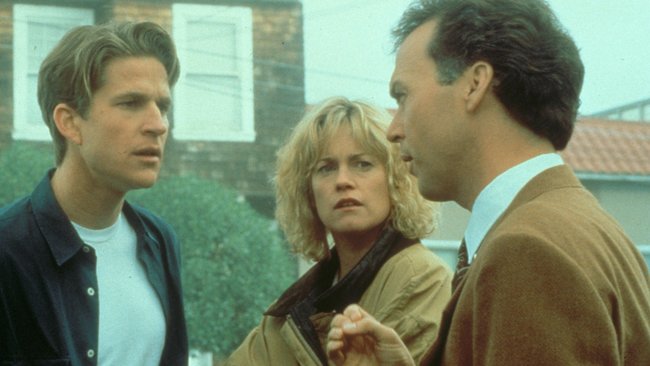
A is for Architecture
Three-storey wooden odes to suburban idyll, spacious art deco apartments with giant windows and pristine contemporary work spaces with historical exteriors all feature regularly in Yuppies In Peril films, a sub-genre that has always shown an unmatched ability to mine tension from the flat utilitarian lines found in mid-Century modern abodes. In addition to emphasizing the artform’s aesthetic values, Yuppies In Peril films also often present architecture as an idealized profession for a protagonist. There is perhaps no more architecturally-obsessed Yuppies In Peril movie than Pacific Heights (1990), in which Matthew Modine and Melanie Griffith’s attempts to climb the property ladder in the hip San Francisco suburb are amusingly thwarted by Tenant From Hell Michael Keaton. This Vanity Fair article about more recent events in Pacific Heights practically reads like a sequel to the film. A sequel I would watch. Another architecture-centric Yuppies In Peril film is Hider In The House (1989), which tapped into the universal fear that Gary Busey is in the walls.
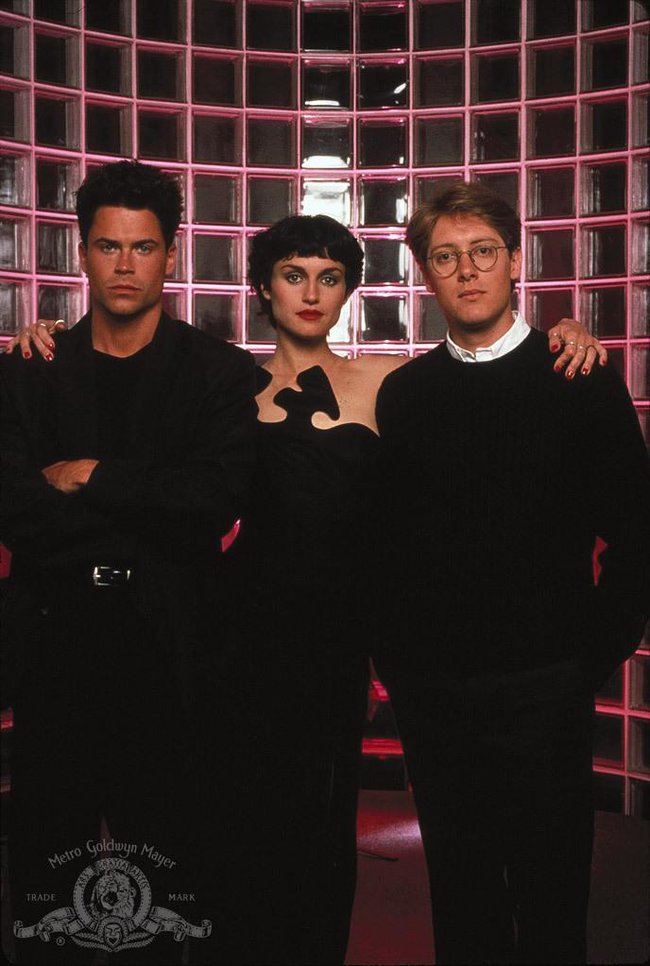
B is for Bad Influence
Before he got all high-falutin’ on us, Oscar-winner Curtis Hanson (L.A. Confidential, 8 Mile) directed two of the very best Yuppies In Peril films, The Hand That Rocks The Cradle (1992, see: H, V), and this glossy fever dream from 1990, memories of which tends to be overshadowed by those of the Rob Lowe sex-tape scandal that accompanied its release. Lowe has rarely been better as a charming sociopath who spurs meek financial analyst James Spader into exploring his inner alpha-male. A modern viewing of the film renders Lowe’s Alex something of a proto-Tyler Durden in how he alluringly embodies his new friend’s idealized conception of himself. Additionally, it’s not hard to imagine Alex as Lowe’s character from Masquerade (1988, see: M), a little older, a little wiser and a little less blown-up. Perhaps more so than any other Yuppies In Peril film, Bad Influence is carried along by the dynamics of the Specious Clique Adoption sub-genre (see: a coming feature on this website).
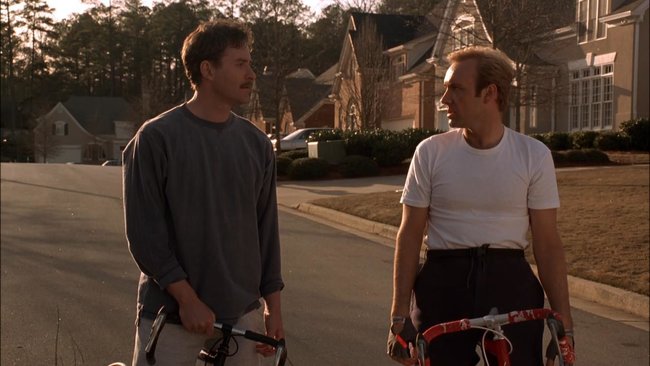
C is for Consenting Adults
This couple-swapping thriller from 1992 featuring an early lead performance from a pre-Usual Suspects Kevin Spacey places the ‘Meech-some’ from House of Cards in an all-new context. Although not without some classic suburban Yuppies In Peril peril, the film ultimately fails to live up to the talent involved. Mary Elizabeth Mastrantonio deserved more than this. It represents something of a career nadir for legendary director Alan J. Pakula (Klute, The Parallax View, All The President’s Men) who two years earlier had revitalised the legal thriller by infusing it with some domestic Yuppies In Peril conflict in Presumed Innocent (1990), a dynamic subsequently expanded upon by Sydney Pollack in The Firm (1993), which derived much tension from the materialistic ambitions of its youthful protagonist.
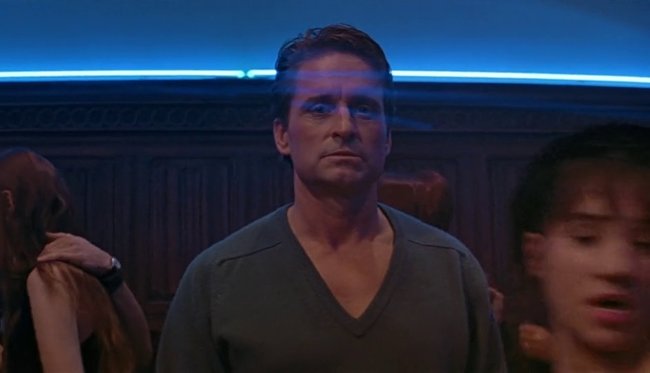
D is for Douglas, Michael
The patron saint of the Yuppies In Peril film, and the sub-genre’s prototypical male archetype, Michael Douglas set the mold for the yuppie in freefall with his performance in Fatal Attraction (1987, see: F), then later wittily deconstructed the trope with his role in David Fincher’s underrated Neo-Yuppies In Peril thriller, The Game (1997). In between those two, Douglas played off his status as cinema’s premier yuppie in Wall Street, Basic Instinct (although he played a cop, that sweater was allll yuppie) and Disclosure, although only the last film really qualifies as a Yuppies In Peril movie. Anne Archer, Douglas’ co-star in Fatal Attraction similarly stands as the prototypical “wronged yuppie wife”, and she subsequently delivered a variation on that persona in Patriot Games (1991), an action thriller heavily informed by the domestic trauma of the Yuppies In Peril film.
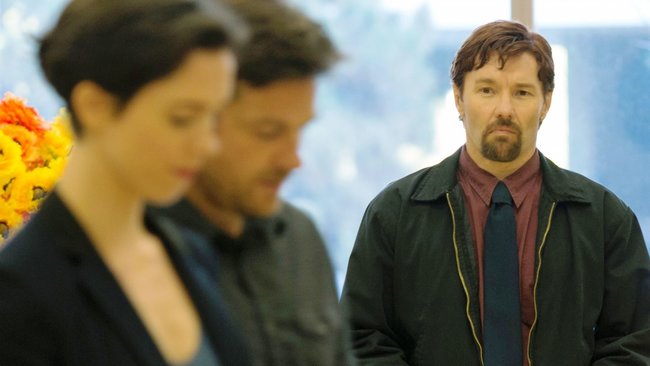
E is for Edgerton, Joel
Writer/director and star of The Gift (2015), a recent minor hit that offered a surprisingly affecting and emotionally authentic take on a classic Yuppies In Peril set-up. Edgerton plays a former classmate who awkwardly attempts to ingratiate himself into the lives of a couple of delightful modern yuppies played by Rebecca Hall and a revelatory Jason Bateman. The film contains all the thrills of an old-school Yuppies In Peril film, but also offers up nuanced insights on social entitlement and the lasting wounds of pubescent trauma. The Gift stands as one of the best Neo-Yuppies In Peril (see: N) films of recent years, and makes a strong artistic argument for continued exploration of the form.
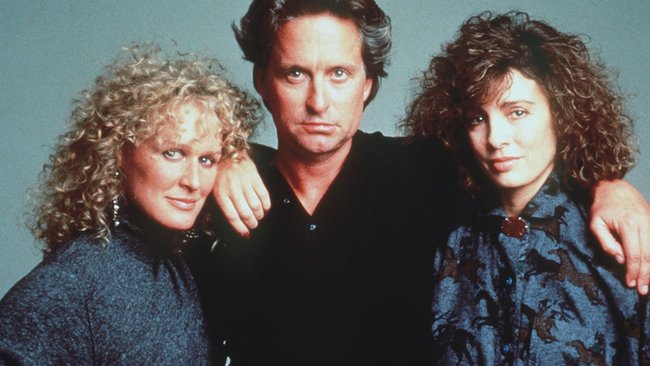
F is for Fatal Attraction
Adrian Lyne’s 1987 thriller spoke to the social zeitgeist in a way that no other Yuppies In Peril film has ever been able to replicate, and in doing so essentially created the sub-genre. It set an impossibly high standard which nevertheless informed the potential of every Yuppies In Peril film it inspired, and served as template for a vast number of them. Both of Lyne’s attempts to recapture the magic—Indecent Proposal (1993) and Unfaithful (2002)—suffered from emphasizing emotional trauma over tangible peril in the name of being a serious movie. But with Fatal Attraction remaining a social lightning rod almost 30 years after its release, not only as a cautionary tale about infidelity but also as a contributor to the pop culture patois via the ubiquitous designation “Bunny Boiler”, Lyne, Douglas, Archer, screenwriter James Dearden, the bunny and of course Glenn Close deserve recognition as the key architects of the Yuppie In Peril sub-genre as we know it.
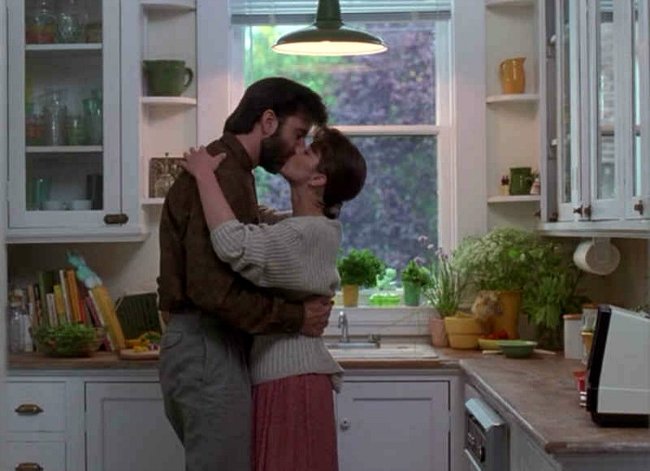
G is for Golden Grace Period
The early section in every Yuppies In Peril film which sets up what is at stake by presenting the protagonists’ lives at their most idyllic. These intoxicating portrayals of materialistic splendour are great at lulling the viewer into a dozy and contented lifestyle bliss. The Golden Grace Period often includes a Breakfast scene in which a character who is late for work will consume toast or bacon on the run while exchanging quips with a preternaturally sassy kid. The fifteen or so minutes that comprise the GGP are usually my favorite part of any Yuppies In Peril movie, and they’re almost always better at portraying aspirational lifestyle fantasies than lighter films focused solely on doing so.
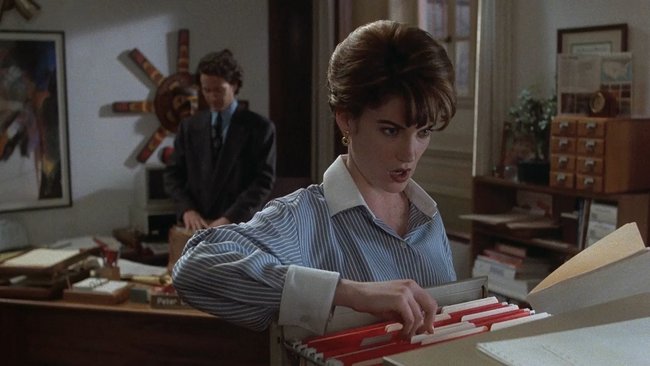
H is for Hell
The metaphorical location from which the vast majority of otherwise seemingly innocuous Yuppies In Peril antagonists come to wreak their vengeance. Following Glenn Close’s stunning, unrivaled turn as the One Night Stand From Hell in Fatal Attraction, the gauntlet for these kinds of roles was thrown down by Rebecca De Mornay with her Bette Davis-worthy performance as the Nanny From Hell in The Hand That Rocks The Cradle (1992). Films in Cradle’s immediate wake like Single White Female (Roommate From Hell), The Temp (Secretary From Hell) and Malice (Surgeon From Hell) helped popularize the trope, which continues to inform a wide range of film and TV, making it perhaps the most tangible legacy of the Yuppies In Peril sub-genre. Other examples include Sleeping With The Enemy (Husband From Hell, 1991), Unlawful Entry (Helpful Cop From Hell, 1992, see: U) The Good Son (Child From Hell, 1993), Changing Lanes (Fender Bender From Hell, 2002).
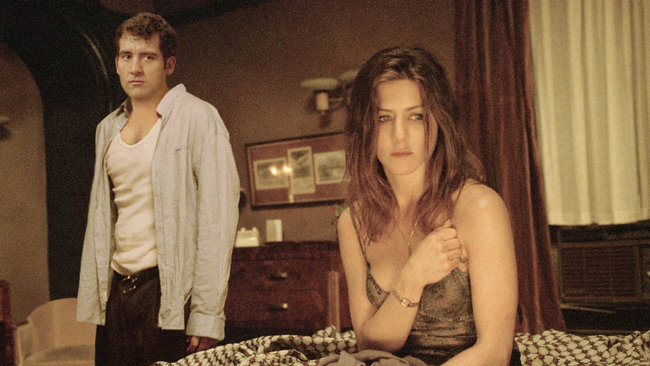
I is for Infidelity
An activity which presages many Yuppie descents into peril, most obviously and influentially in Fatal Attraction, but also memorably in the aforementioned Disclosure, Unfaithful, Gone Girl (2014) as well as Derailed (2005), an entertaining, if inelegant, late-arriving dip into classic Yuppies In Peril territory starring Clive Owen as a married businessman who gathers the gumption to finally act on his commuter crush on Jennifer Aniston, then lives to regret it, teaching us all a valuable lesson about what could happen if you approach that beautiful woman on the bus.
J is for Jackman, Hugh
Starred alongside Ewan McGregor in Deception (2008), an (almost) amusingly terrible final sputter of the classic Yuppies In Peril sub-genre that cribbed shamelessly from Bad Influence (see: B) without providing any of that film’s juicy delights. The plot concerns a mysterious VIP sex club for high-flying businessmen - you have to work hard to make that set-up boring. Jackman and McGregor are both surprisingly bland in a film that had the potential to be a noteworthy exercise in lurid camp.
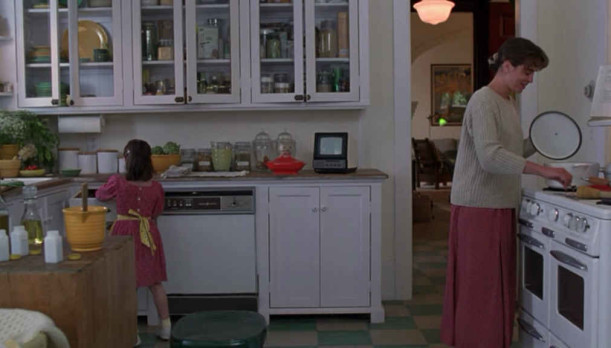
K is for Kitchens
If there’s one single element common to every Yuppies In Peril film, it’s an extremely nice kitchen.
L is for Leigh, Jennifer Jason
The legendary actor (Fast Times At Ridgemont High, The Hudsucker Proxy) played delightfully off her inherent likability as Heddy, Bridget Fonda’s obsessed roommate in Single White Female, which hilariously foreshadowed Heddy’s villainy by showing her engaging in the sinful act of… masturbation. Clearly, she was all kinds of disturbed. Also stabbed a dude in the eye with a stiletto heel and killed a puppy. Leigh’s Heddy is an all-time great Yuppies In Peril villain.
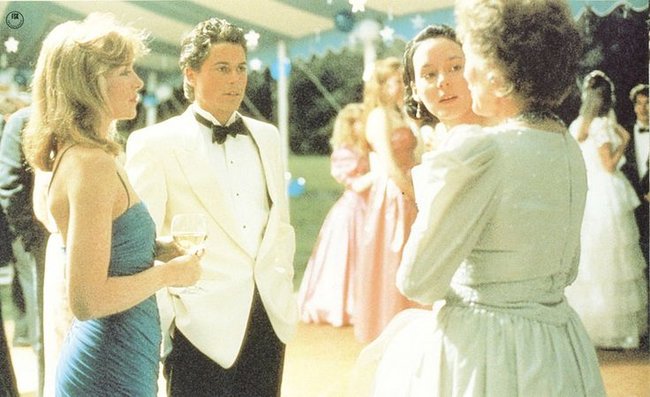
M is for Masquerade
The monied sailing set is an all-too appropriate milieu for a Yuppies In Peril story, and one that remains underexploited. This 1988 thriller stands as the prevailing exception, and just as in Bad Influence, the sub-genre brings out the best of Rob Lowe, who textures his Tom Ripley-lite character in Masquerade with a subtle hesitancy. The film holds up better than its minor historical status might indicate, and stands as a pristine example of just how cleanly-laundered a good Yuppies In Peril film should be.
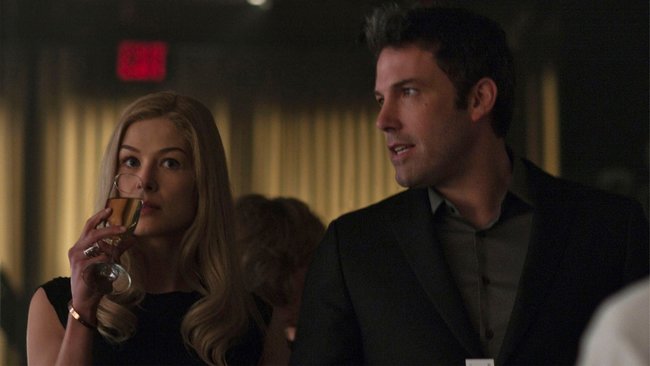
N is for Neo-Yuppies in Peril
A term that has become increasingly useful of late thanks to the richer explorations of Yuppies In Peril dynamics in films like Gone Girl, the The Gift (see: E) and The Invitation (2016), which is an absolute must-see. Although the social and moral context has evolved from the earlier films, Neo-Yuppies In Peril films tap the same conflicts and desires, which only enriches the tension, revealing a timelessness to the way the best examples of the sub-genre fuse our happiness fantasies with our darkest fears.
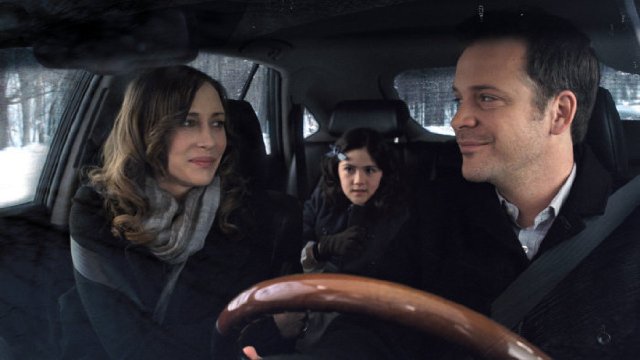
O is for Orphan
This underrated thriller from 2007 is a great example of how a horror-leaning film can be enhanced by elements typically found in a Yuppies In Peril movie. Peter Saarsgard and Vera Farmiga star as owners of an extremely nice house who decide to remedy its relative emptiness by adopting a third child: a strange little Eastern European girl played with unnerving conviction by Isabelle Fuhrman (The Hunger Games). You wouldn’t necessarily describe Esther as the Foster Child From Hell, but the film has a lot of fun teasing this and many other possibilities. Orphan’s director Jaume Collet-Serra has since proved himself to be the most reliably proficient director of mid-sized genre movies working today, and I’d love to see him get his hands on a straight Yuppies In Peril film, a tricky tone to pull off in a contemporary context. Orphan, Non-Stop, Unknown and Run All Night suggest Collet-Serra is the man for the job. The woman for the job is Karyn Kusama, who directed The Invitation, one of the best Neo-Yuppies In Peril films out there. The undeniable awesomeness of the film is surely generating all sorts of cool offers for her, I just hope she stays in the Yuppies In Peril wheelhouse for her next effort.

P is for Perfect Guy, The
Quietly successful 2015 thriller starring Sanaa Lathan as a business professional who struggles to rid herself of an obsessive rebound fling played with entertaining intensity by Michael Ealy. The most recent in a minor trend of African American-centric entries in the ever-evolving Yuppies In Peril sub-genre, following the Fatal Attraction-esque Obsessed (2008) and No Good Deed (2009), both of which starred Idris Elba. The Perfect Guy’s $50-million-plus gross is a clear indicator that audiences have an appetite for these kinds of films.

Q is for Quinlan, Kathleen
She played the Yuppie in Peril in Breakdown (1997), an action-oriented entry in the sub-genre that used the financial failure of its lead characters as a launching point for their troubles involving a truck driver played by the late, great JT Walsh. Early on in the film, Quinlan memorably delivers the film’s most critical line of dialogue to her husband played by Kurt Russell: “90,000 donuts or 90,000 dollars?” These are figures yuppies can relate to.
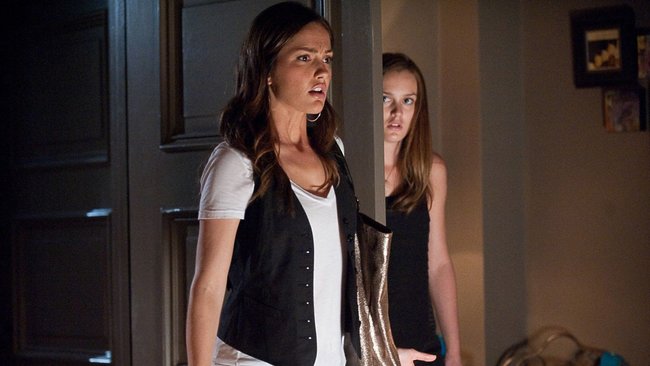
R is for Roommate, The
Well-cast but uninspired 2011 retelling of Single White Female, which just as Swimfan (2002) did with Fatal Attraction, simply recycled the premise of its inspiration in a college setting. There was considerable potential here: Leighton Meester gave good Yuppie in Gossip Girl, and the idea of her playing the obsessed roommate of her celebrity doppelgänger Minka Kelly promised all sorts of fun. But alas, there was none. Youth generally did not have a huge role to play in Yuppies In Peril movies before Swimfan, The Roomate and the turgid remake of the next entry in this feature came along, but they didn’t exactly set the box office on fire and the minor trend appears to have dissipated.
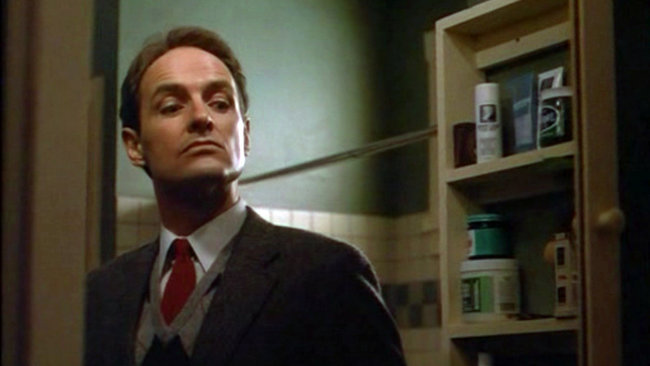
S is for Stepfather, The
Beloved 1987 cult classic that stands as a transitional film between ’80s slashers and the more lifestyle-concious thrillers that gave birth to the Yuppies In Peril sub-genre. Terry O’Quinn balances the mania nicely as a murderous Ward Cleaver wannabe while the film places an amusing emphasis on suburban idyll. Inspired some not-so-great sequels and an inert 2009 remake.
T is for Television
A medium which has been tapping into Yuppies In Peril dynamics for several decades now with varying degrees of success in shows like Revenge, Damages, Deception, Hostages, The Good Wife, Scandal, How To Get Away With Murder and Billions. The aborted HBO adaptation of Jonathan Franzen’s The Corrections could’ve done something interesting in this realm.
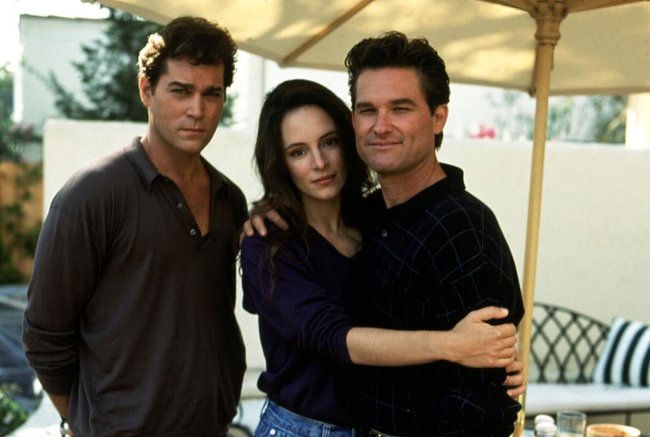
U is for Unlawful Entry
On the seedier side of the Yuppies In Peril spectrum but worth a watch nonetheless is this 1992 thriller, mainly thanks to how it captures Ray Liotta at his post-Goodfellas serpentine best—he’s all lizardy stares as a deranged LAPD officer who ingratiates himself into the lives of a couple played by Kurt Russell and Madeleine Stowe after their house is burgled. Helped bring to light the systemic suffering of white people at the hands of the LAPD. 2008’s Lakeview Terrace appears to be partially inspired by Unlawful Entry, with Samuel L. Jackson in the Liotta role and Patrick Wilson and Kerry Washington as the couple. It’s not a great movie.
V is for Violent Deaths
A reliably common occurrence in Yuppies In Peril films to the point where some are almost worthy of a Final Destination sequel. Such as Julianne Moore succumbing to falling glass shards in The Hand That Rocks The Cradle, or Scott Coffey getting his arm mangled by a paper shredder in The Temp, or Neil Patrick Harris spilling all over the floor in Gone Girl. Not to mention what happened to the bunny in Fatal Attraction, and even worse, the puppy in Single White Female.
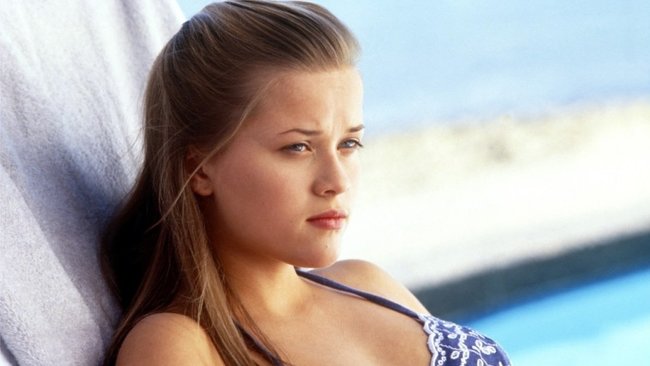
W is Witherspoon, Reese
In one of her first big leading roles, Witherspoon starred in the 1996 thriller Fear as Nicole Walker, a teenage goody-two-shoes who falls for an older bad boy played by Mark Wahlberg. Those elements alone might not qualify it for Yuppies In Peril status, but the film earns inclusion for the emphasis it places on the perspective of Nicole’s concerned father, played with a permanently furrowed brow by William Peterson, making it kind of a Boyfriend From Hell movie. Still primarily remembered for unironically attempting to wring romantic drama from of a scene in which a character gets fingered on a rollercoaster. Nevertheless, I would like to see Witherspoon return to the sub-genre.
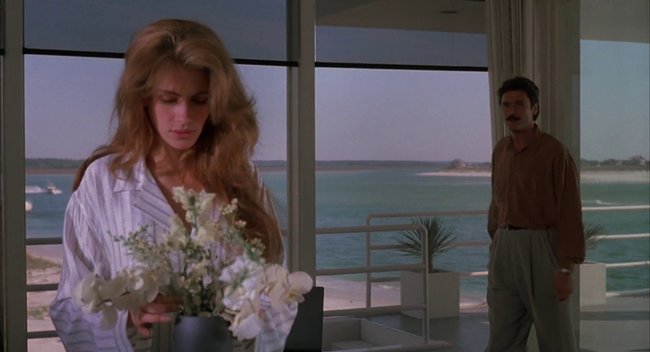
X is for Ex-Husbands
The driver of much peril in Yuppies In Peril films, most iconically in the 1992 Julia Roberts hit Sleeping with the Enemy, in which Patrick Bergin gives good psycho as a possessive husband who really wants his towels all lined up just so. Jennifer Lopez faced off against an evil ex played by Billy Campbell in 2002’s Enough, which was generally perceived to be a retread of the 1992 film. More recently, Lopez starred as a single mom who regrets a sponaneous dalliance in The Boy Next Door (2015), a valiant attempt at a classic Yuppies In Peril thriller which never fulfills its true promise.
Y is for Yuppies
As so eloquently evinced by Teddy Wayne in his New York Times piece (did I mention I am quoted in it?), a term that began its existence with perjorative connotations and hasn’t gathered much esteem since. As also illustrated by Wayne, a presence in all sorts of films, not just those being discussed here. Although I would argue that Yuppies In Peril films have done more to keep the stereotype alive than any other kind.
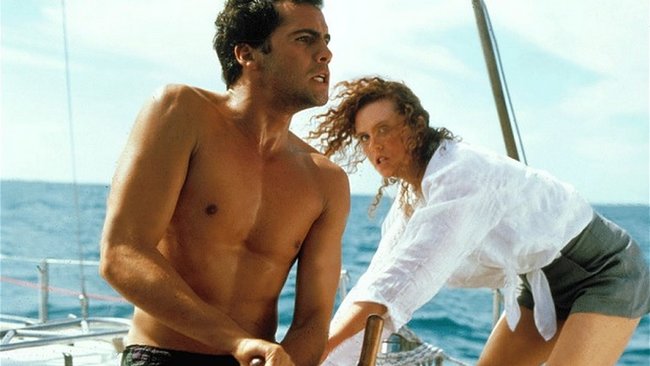
Z is for Zane, Billy
Memorably embodied a psychotic and virile yuppie nightmare in Dead Calm (1989), a excellent Australian entry in the sub-genre directed by Phillip Noyce (Sliver). Sam Neill and Nicole Kidman co-star as a couple in mourning on a restorative sailing trip which takes a turn for the perilous after they encounter Zane’s babbling, tanned castaway on the high seas. Dead Calm is a master class is cinematic tension-building. Noyce should really have another crack at this sub-genre. Sliver doesn’t count.
